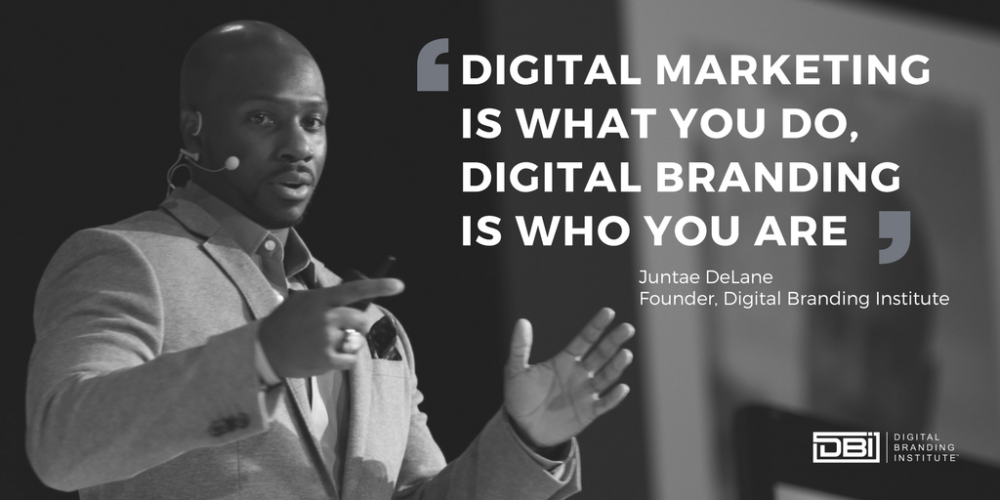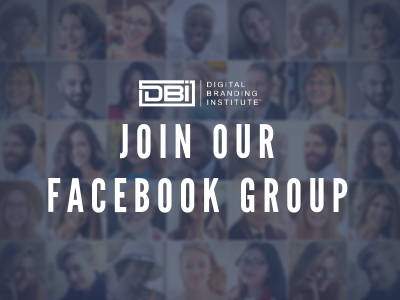What customers are saying about us is more important than what we are saying about ourselves. Our digital branding efforts say a great deal about who we are and what value we provide to our prospective customers, clients, partners, members, or consumers.
The average person may believe that digital branding is focused on our logo or website design and how it may impact a consumer’s perception of our brand.
But, it’s much more complicated.
In a connected world with many online touchpoints (such as websites or apps, search engine results, online reviews, or social media discussions), most decisions are made after experiencing your brand in the digital space.
Let’s face it, getting new customers has become increasingly difficult with the amount of content, information, and options available to your target audience. Now, you must understand the traditional approach to marketing is no longer sufficient.
You need to understand how your digital brand is impacting the likelihood of your audience purchasing your products or services, joining your organization, or becoming a partner or sponsor.
That’s why digital branding is important to your business. Keep reading and you’ll understand how it works.
What is Digital Branding?
Your audience is being bombarded with advertising and marketing messages that inhibit your ability to foster a special connection. The same talent or expertise is offered all over the Internet but what separates you from the competition is your story and how it’s presented in the digital space.
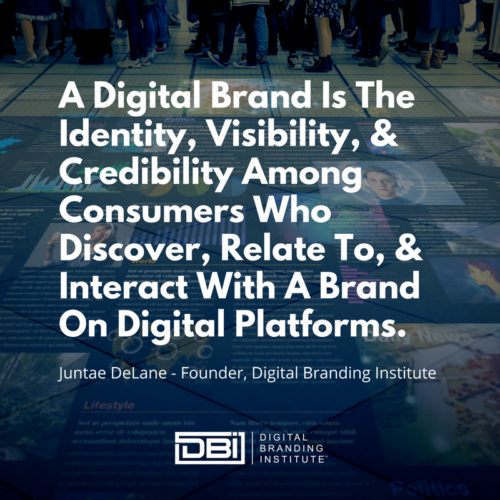
Digital branding is about establishing your brand’s story and presence in the digital space. Digital branding is the key to establishing a meaningful connection with your target audience. It’s about using your unique proposition to differentiate yourself and your offerings from the competition.
Now let’s break each component down to familiar marketing terms.
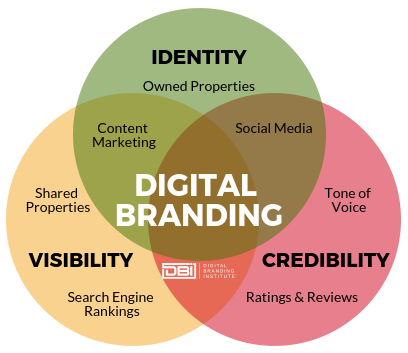
Your Digital Identity
Digital branding must be different than our traditional ideas of branding. A brand can’t just tell us what it represents and then expect us to believe it. A brand needs to live its values and then communicate them via digital branding.
Two powerful mediums used to build your digital identity are content marketing and social media.
Content Marketing
When you are asked about your upbringing, what motivates you, or how you’ve achieved certain goals, you may find yourself telling a story. A story about the challenges faced and obstacles you’ve overcome. More importantly, how those challenges impact the offerings you provide, or product or services you’ve developed.
In essence, this is your identity.
Understanding how the challenges you’ve faced relate to the wants and needs of your target audience is important. Content Marketing is best used for providing relevant content suited for the various stages of a user’s journey that convey how, through a strategic series of content, your product or service is a solution.
It is important to note, providing value beyond what you’re offering is the best way to begin building your identity. Re-enforcing your value proposition or why you are better than the competition is the best way to continue engaging with your target audience.
SEE ALSO: Content Planning Tips To Compete with Big Brands
Now, let’s move on to how social media is used to build your digital identity.
Social Media
Your social media engagements convey the voice of your brand. From your status updates to the way in which you respond to comments convey your brand’s voice. Your social media activity is a great awareness builder and can be used to shape your identity.
If you’re unsure how to begin, start with social listening to help inform your digital identity. Examine audience chatter to guide your digital identity. You don’t have to change your identity based on what your audience wants. You need to change the way in which you speak to your audience and your identity will be shaped by that experience.
SEE ALSO: The 5 Rules of Social Media Optimization (SMO)
Once you’ve established your identity, it’s time to focus on your visibility.
Your Visibility
Touchpoints
The second component of your digital brand is visibility. Consider this all the touchpoints at which your target audience is exposed to your brand in the digital space.

This includes your website, online search results, social media networks, and review sites. Naturally, priority and resources are placed on “controlled” touchpoints such as your website but the most influential touchpoints are ones that are “uncontrolled” which are your ratings and review sites.
SEE ALSO: 6 Psychology Based Design Tips to Improve Engagement on Your Website
Digital Ads
Digital Advertising also contributes to your visibility as well and is considered a “controlled” touchpoint. With a strong digital advertising campaign, you can create highly targeted campaigns.

SEO
A critical part of your visibility is your audience’s search engine results. Being listed at the top of search engines will not only help increase your visibility but it conveys that you are aware of your target audience’s needs and understand their search behavior.

Search engine results also build credibility as many consumers believe if a brand is displayed in the first position in their search engine results, it must be very credible.
SEE ALSO: How to Improve Brand Signals For Better SEO
Your Credibility
You can spend years building your credibility but it can take seconds to be ruined. It is important to actively build the feedback loop with your target audience to protect your creditability. A properly established digital brand can utilize all touchpoints to collect feedback which, in turn, will enhance credibility.
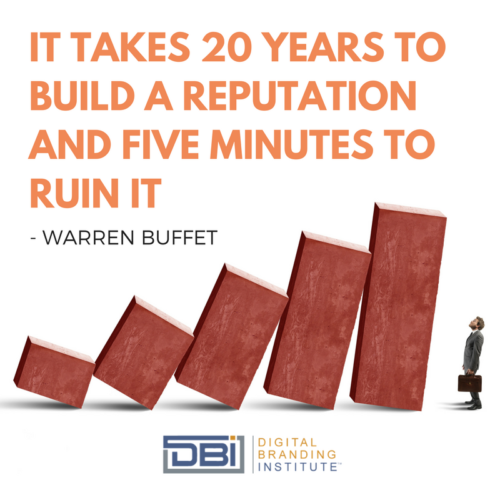
Social Engagements also contribute to your credibility. When using social engagements for digital branding we must consider overall user experience and focus on transparency and trust. If you are attentive to your followers and respond authentically, you will naturally increase your credibility.
Digital Branding Benefits for Professionals
As a professional, understanding the difference between digital branding and personal branding is critical to your digital branding efforts.
Digital branding is not personal branding. The impetus of personal branding is being known while for digital branding, it is conversions.
SEE ALSO: Digital Branding vs Personal Branding
Below you will find a list of how digital branding affects various industries and occupations.
Authors – A digital brand will help you find a literary agent that’s looking for new talent. That agent is going to look at your digital brand to see how many books you may sell.
Attorney’s – As an Attorney with a great digital brand you are able to get more clients and leads as your digital presence is going to bring people who search for lawyers to your business.
Real Estate Agents – If you’re a real estate agent, you’re going to get more leads, have more reviews, work with new homeowners or people who are trying to buy investment properties and so on and so forth.
Consultants – If you are an expert in your field and you do not have a digital brand, you are not an expert (at least in the eyes of most consumers). People are going to engage with your brand whether you have an established brand or not. Take control of your digital brand and make it easy for people to interact with you and to build more credibility.
Pastors & Spiritual Leaders – If you’re a pastor and you want to build a congregation or more followers, your Digital Brand is going to help grow that congregation.
Public Officials – We all know the importance of the digital platform and the role it played in the recent elections. So if you have this lackluster Digital Brand it will be more difficult to garner donations or galvanized this base that you’re trying to develop.
Business Executives – As a business executive, it’s best to separate yourself from other executives. Use your digital brand to display the value that you are going to bring to an organization.
Entertainers – As an entertainer, you can use your digital brand to bring more eyeballs, or more views to a production. If you want to build your online platform that surpasses your competition, you have to build that Digital Brand.
Everyone Else – Now ultimately, if you are in the business of offering a product or service, your digital brand is going to help guide your target audience through their decision-making process.
No matter what your industry or occupation digital branding applies to your unique situation. You want to make sure you have a better understanding of how digital branding can affect you and your business and how you can use it to market your talent, skill or expertise.
Digital Branding Benefits for Organizations
As an organization, digital branding puts you ahead of the curve.
Understanding how today’s technology comes together to develop remarkable experiences for your customers, clients, leads, patients, and consumers is the first step to building a robust digital brand. Pulling these technologies together to build relationships with your target audience is critical to your digital branding execution.
Since, today’s consumer utilizes digital platforms (i.e. online search, social media, mobile apps, etc.) to aid their purchasing decisions, establishing a robust digital brand will increase your customer acquisition, lead generation, content consumption, and brand awareness.

A great example that most of us have experienced is buying a car. During this process, you can do a lot of research to make an informed decision before speaking with the car dealership. When you decide to enter the building, you are now more informed and your perception of the brand will guide you through this process.
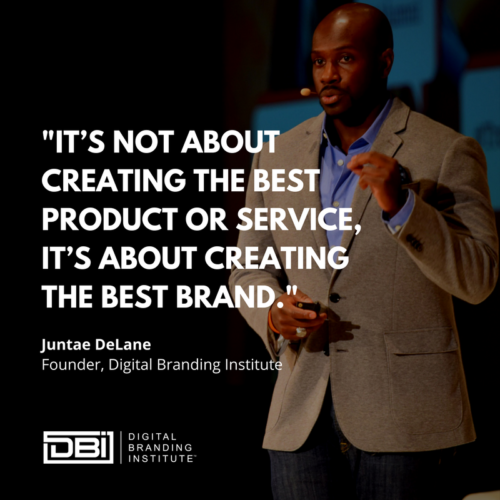
This is the reason why digital branding is so important for your business. Customers will be far more informed about your brand before patronizing your business. Make sure you focus on enhancing your digital brand presence so your customer will feel more comfortable doing business with you.
For Corporations
Today’s consumers expect for corporations to be more transparent—actually, they demand it. When corporations focus on building a robust digital brand, they will have a deeper understanding of how consumers interact with their brand in the digital space. This understanding will not only affect its marketing but its business operations as well.
For Non-Profits
As a non-profit organization, your digital brand is critical to your funding, donations, and increased awareness of your cause. One way donors validate your efforts is reviewing your digital efforts. A great non-profit digital brand will convey the innovation, competency, and business acumen of the organization.
For Small Businesses
As a small business, much of your digital brand will be based on the efforts of your owner or CEO. A strong digital brand will help to differentiate your business and convey why you are unique. In a crowded marketplace, you must do everything you can to put your businesses in the best position to win.
Most small businesses do not have the marketing budgets to compete with Fortune 100 companies. Focusing on digital channels is significantly cheaper than traditional marketing channels. As a result, there is a greater need for small businesses to establish a stronger digital brand so they can effectively reach more customers.
A Digital Branding Failure
Brands are increasingly trying to showcase more personality in their marketing communications. Some do this well, while others, not so much.

Brand’s that convey a personality that is more human-like enhance their trust and authenticity. In traditional marketing, a brand’s personality is sculpted or projected upon consumers. In the digital space, that personality is conveyed through engagement, dialog, and presence and particular platforms. Remember, just showing up and participating in conversations is a statement within itself.
Digital branding can bridge the gap between your business objectives and what your target audience wants to engage with.

If your consumer wants to find you or check your references, your digital brand should immediately address these concerns.
Final Thoughts
It doesn’t matter if you are an individual looking to profit from your expertise or an organization looking to convert your audience, digital branding must be prioritized. Digital branding is a business’ identity, visibility, and credibility among consumers who discover, relate to, and interact with the business online.
Since, today’s consumer utilizes online platforms (i.e. online search, social media, mobile apps, etc.) to aid their purchasing decisions, establishing a robust digital brand will increase your customer acquisition, lead generation, content consumption, and brand awareness.
As business owners, marketers, or people looking to build an audience, we all must focus on building a strong digital brand because, at the end of the day, our business depends on it.
I want to know your thoughts. What do you believe is the most difficult part of building your digital brand? Leave your comment below…



